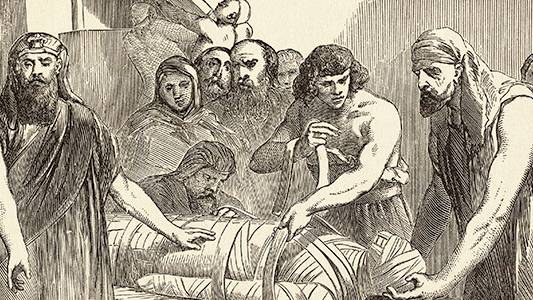The Gruesome History of Eating Corpses as Medicine
Source: smithsonianmag.com

The last line of a 17th century poem by John Donne prompted Louise Noble’s quest. “Women,” the line read, are not only “Sweetness and wit,” but “mummy, possessed.”
Sweetness and wit, sure. But mummy? In her search for an explanation, Noble, a lecturer of English at the University of New England in Australia, made a surprising discovery: That word recurs throughout the literature of early modern Europe, from Donne’s “Love’s Alchemy” to Shakespeare’s “Othello” and Edmund Spenser’s “The Faerie Queene,” because mummies and other preserved and fresh human remains were a common ingredient in the medicine of that time. In short: Not long ago, Europeans were cannibals.
Noble’s new book, Medicinal Cannibalism in Early Modern English Literature and Culture, and another by Richard Sugg of England’s University of Durham, Mummies, Cannibals and Vampires: The History of Corpse Medicine from the Renaissance to the Victorians, reveal that for several hundred years, peaking in the 16th and 17th centuries, many Europeans, including royalty, priests and scientists, routinely ingested remedies containing human bones, blood and fat as medicine for everything from headaches to epilepsy. There were few vocal opponents of the practice, even though cannibalism in the newly explored Americas was reviled as a mark of savagery. Mummies were stolen from Egyptian tombs, and skulls were taken from Irish burial sites. Gravediggers robbed and sold body parts.
“The question was not, ‘Should you eat human flesh?’ but, ‘What sort of flesh should you eat?’ ” says Sugg. The answer, at first, was Egyptian mummy, which was crumbled into tinctures to staunch internal bleeding. But other parts of the body soon followed. Skull was one common ingredient, taken in powdered form to cure head ailments. Thomas Willis, a 17th-century pioneer of brain science, brewed a drink for apoplexy, or bleeding, that mingled powdered human skull and chocolate. And King Charles II of England sipped “The King’s Drops,” his personal tincture, containing human skull in alcohol. Even the toupee of moss that grew over a buried skull, called Usnea, became a prized additive, its powder believed to cure nosebleeds and possibly epilepsy. Human fat was used to treat the outside of the body. German doctors, for instance, prescribed bandages soaked in it for wounds, and rubbing fat into the skin was considered a remedy for gout.
Blood was procured as fresh as possible, while it was still thought to contain the vitality of the body. This requirement made it challenging to acquire. The 16th century German-Swiss physician Paracelsus believed blood was good for drinking, and one of his followers even suggested taking blood from a living body. While that doesn’t seem to have been common practice, the poor, who couldn’t always afford the processed compounds sold in apothecaries, could gain the benefits of cannibal medicine by standing by at executions, paying a small amount for a cup of the still-warm blood of the condemned. “The executioner was considered a big healer in Germanic countries,” says Sugg. “He was a social leper with almost magical powers.” For those who preferred their blood cooked, a 1679 recipe from a Franciscan apothecary describes how to make it into marmalade.
[...]
Read the full article at: smithsonianmag.com
Horrifyingly, Ground Baby Pills Are a Real Thing
In news that will make you want to shut the blinds, go back to bed until next week ... there’s disturbing news out of South Korea that since August, officials have found over 17,000 pills filled with human flesh, in particular the placentas and ground up bodies of dead Chinese babies.
Feel free to walk away from your computer and shake your head for the next few minutes. Perhaps as equally disturbing than the dead baby "bodies were chopped into small pieces and dried on stoves before being turned into powder." (Now you’ll really want to walk away as we tell you that people were, as the Associated Press’ Hyung-Jin Kim reports, consuming these pills as stamina and enhancement boosters and putting themselves at risk. "It was confirmed those capsules contain materials harmful to the human body, such as super bacteria. We need to take tougher measures to protect public health," a customs official said in a report by The Korea Times (which was translated and picked up by the BBC).
Continue...






















